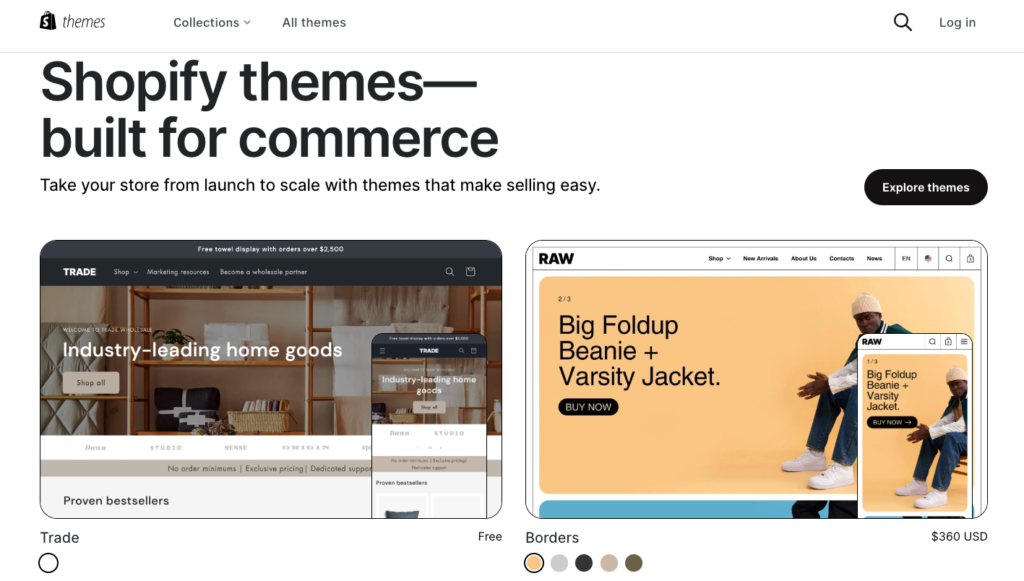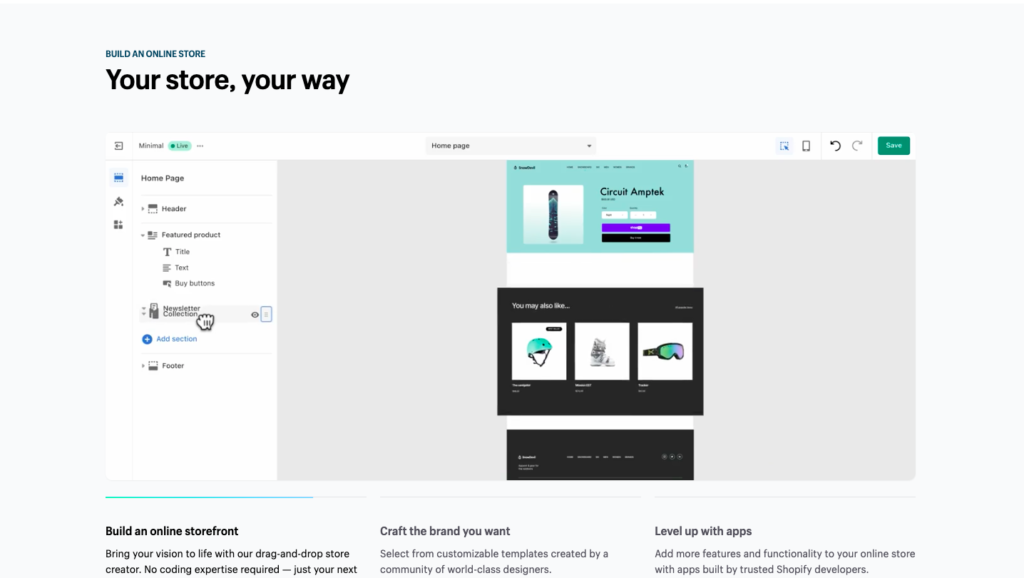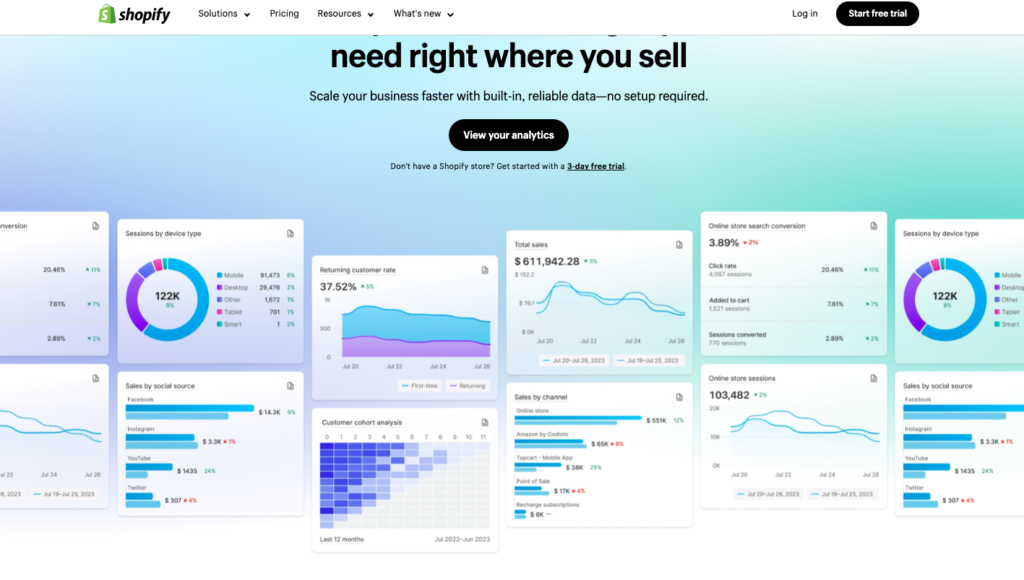Introduction to Shopify
Shopify is a leading e-commerce platform that enables individuals and businesses to create their own online stores and sell products or services. Established in 2006, Shopify has grown to become one of the most popular solutions for online retail, powering over a million businesses worldwide. It provides a comprehensive suite of tools and features designed to simplify the process of running an online store, from setting up your website to managing inventory and processing payments.
What is Shopify?
At its core, Shopify is a subscription-based software that allows you to build an e-commerce website with ease. It offers a user-friendly interface and a range of customizable templates, making it accessible even for those without technical expertise. With Shopify, you can sell both physical and digital products, manage your inventory, and track your sales—all from a single platform.
Key Features of Shopify
- User-Friendly Interface: Shopify’s dashboard is intuitive, allowing users to set up their online store quickly and efficiently.
- Customizable Templates: Choose from a variety of professional templates that you can customize to reflect your brand’s identity.
- Secure Payment Processing: Shopify supports multiple payment gateways, including its own Shopify Payments, ensuring secure and smooth transactions.
- Mobile Optimization: All Shopify stores are mobile-responsive, providing a seamless shopping experience on any device.
- Extensive App Store: Enhance your store’s functionality with apps from the Shopify App Store, covering everything from marketing to customer service.
Why Choose Shopify?
Shopify stands out for its ease of use, scalability, and extensive support network. Whether you’re a small business owner just starting out or a large enterprise looking to expand, Shopify offers solutions tailored to your needs. Its robust features and reliable infrastructure make it a trusted choice for e-commerce entrepreneurs.

Pricing and Plans
shopify offers a variety of pricing plans to suit different business needs and budgets. Understanding these plans is crucial for determining which one is best for your business. Below, we’ll break down each plan, highlighting the features and costs associated with them.
Basic Shopify Plan
The Basic Shopify plan is ideal for new e-commerce businesses that are just starting out. This plan costs $39 per month and includes all the essential features needed to set up an online store. Key features include:
- Online store with unlimited products
- Two staff accounts
- 24/7 customer support
- Sales channels, including online marketplaces and social media
- Basic reports
Shopify Plan
The Shopify plan, priced at $105 per month, is designed for growing businesses. It includes all the features of the Basic Shopify plan, plus additional tools to help scale your business. Key features include:
- Five staff accounts
- Professional reports
- Gift cards
- Better shipping discount rates
- Abandoned cart recovery
Advanced Shopify Plan
The Advanced Shopify plan is tailored for larger businesses looking for advanced features and capabilities. This plan costs $399 per month and includes:
- 15 staff accounts
- Advanced report builder
- Third-party calculated shipping rates
- The lowest transaction fees
Shopify Plus
Shopify Plus is an enterprise-level solution designed for high-volume businesses. Pricing for Shopify Plus starts at $2,000 per month and varies based on your specific needs. This plan offers:
- Unlimited staff accounts
- Dedicated account management
- Advanced customization and integrations
- Priority support
- Enhanced security features
Transaction Fees
Each Shopify plan comes with its own transaction fees if you use external payment gateways. These fees decrease as you move up through the plans:
- Basic Shopify: 2.9% + 30¢ per transaction
- Shopify: 2.6% + 30¢ per transaction
- Advanced Shopify: 2.4% + 30¢ per transaction
Using Shopify Payments can eliminate these transaction fees, making it a cost-effective option for many businesses.
Choosing the Right Plan
Selecting the right Shopify plan depends on the size and needs of your business. For small startups, the Basic Shopify plan provides all necessary tools without overwhelming costs. As your business grows, upgrading to the Shopify or Advanced Shopify plan can offer additional features to support expansion. For large enterprises, Shopify Plus provides comprehensive solutions tailored to high-volume demands. By understanding the pricing and plans offered by Shopify, you can make an informed decision that best fits your business’s requirements and budget.

Design and Customization
Design and customization are crucial aspects when choosing an e-commerce platform, and Shopify excels in this area. Whether you’re a novice or a seasoned web designer, Shopify offers a range of options to create a visually appealing and unique online store.
Shopify Themes
Shopify provides a variety of themes, both free and premium, tailored to different industries and styles. These themes are professionally designed and optimized for mobile devices, ensuring a seamless shopping experience across all devices. You can browse the Shopify Theme Store to find a theme that best suits your brand’s aesthetics.
Customization Options
Once you’ve chosen a theme, Shopify allows extensive customization to make your store truly unique. You can easily adjust colors, fonts, and layout through the built-in theme editor. This user-friendly interface requires no coding knowledge, making it accessible for beginners.
For those with coding skills, Shopify offers advanced customization options. You can edit the HTML, CSS, and JavaScript of your theme, providing complete control over the design. This flexibility is perfect for businesses with specific design requirements or those looking to stand out from the competition.
Mobile Responsiveness
In today’s mobile-first world, having a responsive website is essential. All Shopify themes are mobile-responsive, meaning they automatically adjust to fit different screen sizes. This ensures your store looks great and functions well on smartphones and tablets, enhancing the user experience and potentially boosting sales.
Apps and Integrations
Shopify’s App Store offers a wide range of apps that can enhance the design and functionality of your store. From image galleries and product customization tools to social media integrations, these apps can help you create a more engaging and interactive shopping experience.
Conclusion
Shopify’s robust design and customization features make it an excellent choice for building a unique and professional online store. Whether you use the built-in theme editor or dive into the code, Shopify provides the tools necessary to create a store that reflects your brand’s identity and meets your specific needs. With mobile-responsive themes and a plethora of design-enhancing apps, Shopify ensures your store looks great and performs well across all devices.
By leveraging Shopify’s design capabilities, you can create an aesthetically pleasing and functional e-commerce site that attracts and retains customers

Features and Tools
all sizes. Here’s an in-depth look at some of the key features and tools that make Shopify a leading e-commerce platform:
Product Management
Shopify offers robust product management capabilities. Users can easily add, organize, and manage products through an intuitive dashboard. Features include:
- Bulk Product Uploads: Save time by uploading multiple products simultaneously.
- Inventory Tracking: Automatically track inventory levels and get alerts when stock is low.
- Product Variants: Manage different versions of a product, such as size and color.
Inventory Management
Efficient inventory management is crucial for any online store. Shopify provides tools to:
- Sync Inventory: Synchronize inventory across multiple sales channels.
- Automate Reorders: Set up automated reorder points to avoid stockouts.
- Track Inventory History: Monitor inventory changes over time to identify trends.
Order Management
Handling orders efficiently is key to maintaining customer satisfaction. Shopify’s order management system allows you to:
- Process Orders Quickly: Fulfill and track orders from a single dashboard.
- Automate Notifications: Send automated email updates to customers about their order status.
- Handle Returns and Refunds: Manage returns and refunds with ease.
Marketing Tools
Shopify includes a variety of marketing tools to help you grow your business:
- SEO Features: Built-in SEO tools to optimize your store for search engines.
- Email Marketing: Integrate with email marketing platforms to create and send campaigns.
- Discount Codes: Create discount codes and promotions to attract customers.
Analytics and Reporting
Making informed business decisions requires access to detailed analytics. Shopify’s analytics and reporting tools include:
- Sales Reports: Track sales performance over time.
- Customer Insights: Understand customer behavior and preferences.
- Custom Reports: Create custom reports to analyze specific data points.
Mobile App
The Shopify mobile app allows you to manage your store on the go. Features include:
- Real-Time Notifications: Get notifications for new orders, shipping updates, and more.
- Manage Products: Add and update products directly from your mobile device.
- Track Sales: Monitor sales and key metrics in real-time.
Customer Support Tools
Providing excellent customer support is crucial for retaining customers. Shopify offers:
- Live Chat: Integrate live chat to provide instant support.
- Help Center: Create a self-service help center for common questions.
- Support Tickets: Manage customer inquiries through a ticketing system.
Integrations and Apps
Shopify’s extensive App Store allows you to extend the functionality of your store:
- Third-Party Apps: Access thousands of apps to enhance your store’s features.
- API Access: Use Shopify’s API to build custom integrations.
- Pre-built Integrations: Easily integrate with popular tools like accounting software, shipping solutions, and marketing platforms.
In conclusion, Shopify’s extensive features and tools provide everything you need to build, manage, and grow a successful online store. Whether you’re a small business owner or running a large enterprise, Shopify’s capabilities can support your e-commerce journey every step of the way.

Payment Processing
When it comes to setting up an online store, efficient payment processing is crucial. Shopify excels in this area by offering a variety of payment options that cater to both the store owner and the customers, ensuring smooth and secure transactions.
Supported Payment Gateways
Shopify supports a wide range of payment gateways, making it versatile for businesses operating in different regions. Major payment gateways like PayPal, Stripe, and Authorize.net can be easily integrated. Additionally, Shopify Payments, the platform’s built-in payment gateway, simplifies the setup process and helps you avoid third-party transaction fees.
Shopify Payments
Shopify Payments is Shopify’s own payment solution, designed to offer a seamless experience. With Shopify Payments, you can accept all major credit and debit cards directly through your store. One of the significant advantages is that it eliminates the need for third-party payment providers, thus reducing transaction fees. For example, with Shopify Payments, there are no transaction fees beyond the standard credit card processing fees, which can save businesses a significant amount of money.
Transaction Fees
Understanding transaction fees is essential for managing your store’s profitability. While Shopify Payments helps you avoid additional transaction fees, using third-party gateways does incur extra costs. Depending on your Shopify plan, these fees range from 0.5% to 2%. This makes it beneficial to use Shopify Payments whenever possible, as it directly reduces operational costs.
Multi-Currency and International Payments
For businesses with a global customer base, Shopify’s multi-currency support is invaluable. Shopify allows you to sell in multiple currencies, providing a localized shopping experience for international customers. This feature can be managed through Shopify Payments and ensures that customers see prices in their local currency, making the purchasing process smoother and more intuitive.
Security
Security is paramount when it comes to online transactions. Shopify is Level 1 PCI DSS compliant, meaning it meets the highest standards of security for handling cardholder data. This compliance helps build customer trust, ensuring that their payment information is secure when they shop on your site.

Security and Reliability
When choosing an e-commerce platform like Shopify, security and reliability are paramount considerations. Shopify prioritizes the protection of both your business and customer data through robust security measures.
Security Measures: Shopify employs industry-standard security practices to safeguard your online store. This includes SSL encryption across all pages to ensure that customer data, such as payment information and personal details, remains encrypted and secure during transmission. Additionally, Shopify is PCI DSS compliant, meaning it meets the Payment Card Industry Data Security Standard for handling credit card information securely.
Data Protection: Your store’s data is backed up regularly by Shopify, which ensures that in the event of data loss or corruption, you can restore your store to a previous state. This backup functionality is crucial for business continuity and peace of mind.
Reliability: Shopify boasts high uptime and reliability, with an impressive track record of maintaining operational stability for online stores. This ensures that your store remains accessible to customers without interruptions, minimizing potential revenue loss due to downtime.

- Security Badge: Include an image of Shopify’s security badge or SSL certificate icon to visually reinforce the platform’s commitment to security.
- Uptime Graph: Display a graph showing Shopify’s uptime performance over a period of time, highlighting its reliability.
- Data Backup Process: An infographic or diagram illustrating Shopify’s data backup process can help users visualize how their store’s data is protected.
Customer Support
Customer support is a critical aspect to consider when choosing an e-commerce platform like Shopify. Shopify offers robust customer support options to ensure that users can get assistance when needed.
Support Channels
Shopify provides multiple channels for customer support, including live chat, email support, and phone support. These channels are accessible directly from the Shopify dashboard, making it easy for users to reach out for help.
Availability and Response Times
Support is available 24/7 for all Shopify users. This global support ensures that no matter where you are or what time zone you’re in, you can get assistance promptly. Response times are generally quick, with most queries being addressed within a short period.
Quality of Support
Shopify is known for its excellent customer service. The support team is knowledgeable and trained to handle various issues that users may encounter. Whether you have technical questions, need help setting up your store, or require assistance with billing inquiries, Shopify’s support staff are equipped to assist.
By emphasizing Shopify’s strong customer support capabilities, users can feel confident that they’ll receive the help they need to effectively manage their online store
SEO and Marketing Capabilities
Shopify offers robust SEO and marketing capabilities designed to help merchants attract more visitors and drive conversions. Here’s how Shopify supports your digital marketing efforts:
- Built-in SEO Tools: Shopify provides essential tools to optimize your online store for search engines. You can easily edit meta titles, meta descriptions, URLs, and alt texts for images. This helps improve your store’s visibility on search engine result pages (SERPs) when potential customers search for products related to your store.
- Content Management: Shopify allows you to create and manage blogs directly within your store. Publishing relevant and informative content not only engages your audience but also improves your SEO by targeting long-tail keywords and answering common customer queries.
- Mobile Optimization: With an increasing number of users browsing and shopping on mobile devices, Shopify ensures that your store is fully optimized for mobile. This includes responsive themes and a mobile-friendly checkout process, contributing positively to your SEO rankings as Google prioritizes mobile-friendly websites.
- Integration with Marketing Platforms: Shopify integrates seamlessly with various marketing platforms and tools. You can connect your store to email marketing services, social media channels, and Google Ads. This integration enables you to run targeted marketing campaigns, retarget visitors, and track campaign performance directly from your Shopify dashboard.
- Analytics and Reporting: Understanding your store’s performance is crucial for refining your marketing strategies. Shopify provides built-in analytics and reporting tools that offer insights into your traffic sources, sales trends, and customer behavior. This data helps you make informed decisions to optimize your SEO and marketing efforts.

How useful was this post?
Click on a star to rate it!
Average rating 4 / 5. Vote count: 1
No votes so far! Be the first to rate this post.

